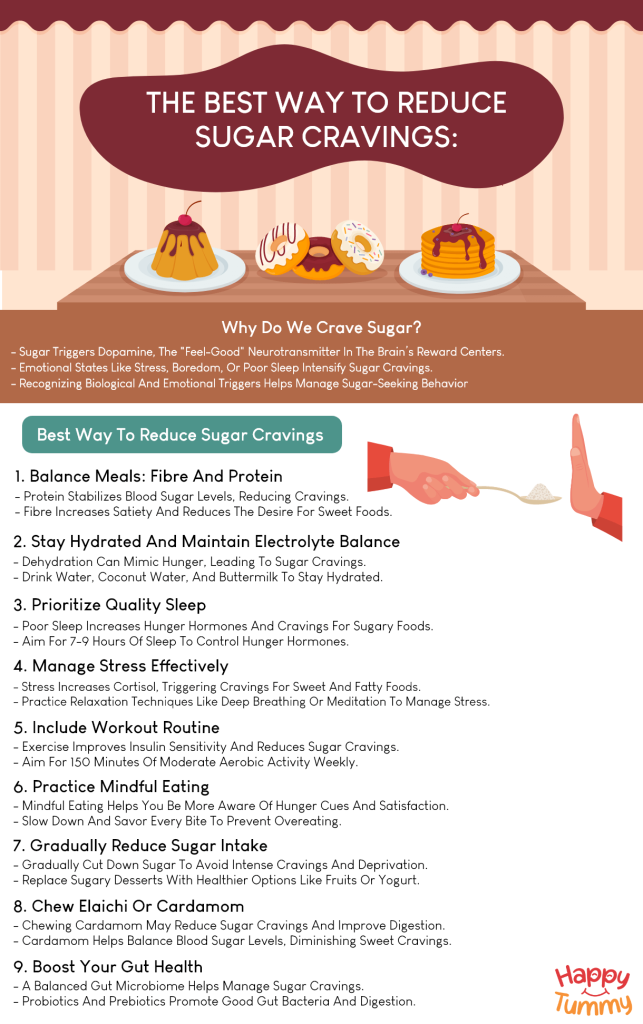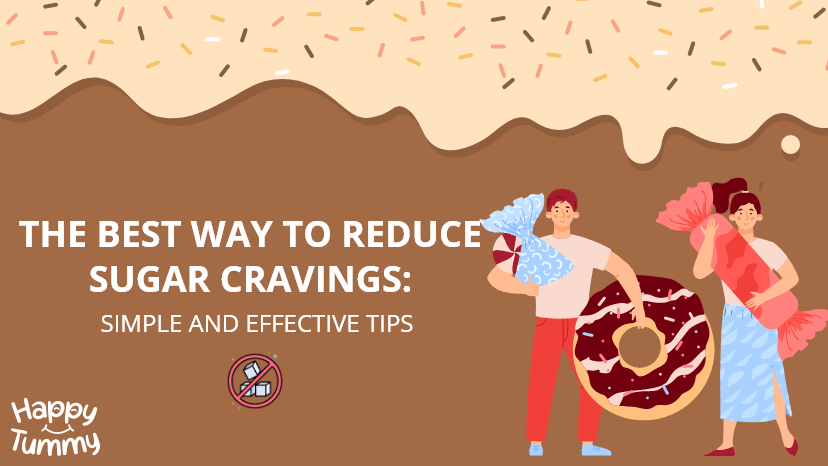Table of Contents
Sugar cravings may seem like the force of nature, and you may find that bias toward a sweet bite even when you are aware that you are not supposed to eat.
It is like it is an eternal battle to resist the urge to have sugar, whether it is in mid-afternoon or at home during the late hours.
Would it not be better to be able to make such desires and passions calm and peaceful without experiencing deprivation or guilt?
The blog will discuss the best and simplest ways to reduce sugar cravings —no crazy diets, no extreme interventions required!
With some of the basic tips and tricks, you can learn to control your cravings, gain more energy, and find healthy and fulfilling alternatives.
Will you dare put your sugar cravings on the street? Let’s dive in!

Why Do We Crave Sugar?
Have you ever found yourself wondering why you are so addicted to sugar? It is not just about eating; it is a science!
When we eat sugar, dopamine — the ‘feel-good’ neurotransmitter — is released in the brain’s reward centres.
Over time, frequent exposure to sugary foods reinforces this pleasure loop, making cravings stronger.
Emotional states like stress, boredom, or poor sleep also heighten sugar-seeking behaviour. Recognizing these biological and emotional triggers is the first step toward managing them.[1] [2]
Best Way to Reduce Sugar Cravings
Dietary shifts, lifestyle changes, and conscious habits may accompany the intention to reduce sugar intake. The ways of making you conquer your sweet tooth include:
1. Balance Meals: Fibre and Protein
Eating protein and fibre in moderation may be one of the best ways to manage your sugar cravings.
Protein may aid normalization of blood sugar levels by delaying the absorption of sugar into the blood, helping avoid spikes and crashes that cause cravings.[3]
On the other hand, fibre fills you up more, thus lessening hunger cravings and the desire for sweet foods. [4]
They keep the vitality up together and avoid impulsive cravings for sweet products.
Include 0.8g per kg body weight or (30-40g) of protein and at least 25–30g of dietary fiber daily.
Protein may support glucose absorption, preventing blood sugar spikes that drive cravings. Fiber enhances satiety and supports gut health.
- Include lean proteins such as chicken, turkey, or tofu in your meals to provide long-lasting energy.
- Use foods rich in fibre, such as vegetables, legumes, and whole grains, to help you feel fuller.
- Eat nuts or seeds, which provide nutrients like protein and fibre to help manage hunger and sugar cravings.
Aashirvaad Atta with Multigrains worked with well-known dietitians to create the My Meal Plan test. The test finds out how much fibre you consume every day and then makes a meal plan that works for you.
2. Stay Hydrated and Maintain Electrolyte Balance
The confusion between dehydration and hunger can make people feel they need sugar even when they do not.
Dehydration of the body sends signals to your brain, and this may resemble the sensation of hunger and thus, the urge to take sweet foods.[4] .
- Consume water throughout the day to stay hydrated and manage hunger.
- Try to keep hydration and electrolyte levels optimum by including drinks such as coconut water, buttermilk, etc., but people with kidney issues must seek guidance from a healthcare professional.
- Eat foods that are high in water, like cucumbers, watermelon, and greens, and you will also stay hydrated and healthy.
- Consume at least 2 liters of water per day to maintain proper hydration, especially for a healthy adult.
3. Prioritize Quality Sleep
Poor sleep raises ghrelin (hunger hormone) and lowers leptin (satiety hormone), increasing cravings for high-sugar foods. Sleep deprivation also reduces insulin sensitivity.[5]
Sleep helps normalize these hormones, manages appetite, and allows a person to make more rational decisions about food.
- Goal 7-9 hours of rest to control hunger hormones and ease cravings.
- Keep a regular sleep routine to help keep your body in its natural rhythm.
- Prepare your room to be sleep-friendly, with a calm, dark environment to enhance the quality of your sleep.
4. Manage Stress Effectively
Stress also increases cortisol secretion, which can make one feel hungry, particularly for sweet and fatty foods.[6] This is commonly known as stress eating.
Stress management may help manage emotional eating to maintain a steady level of blood sugar.
Relaxation techniques like deep breathing or meditation help manage cortisol levels and sugar cravings.
- Meditate or practice mindfulness to relax your mind and manage stress-related cravings.
- Practice frequent relaxation techniques, such as deep breathing, to manage cortisol levels.
- Discover new healthy coping strategies, such as walking, writing, or reading, rather than turning to sweets.
5. Include Workout Routine
Exercise may improve insulin sensitivity and increase endorphin levels, both of which reduce sugar-seeking behaviour.
Aim for at least 150 minutes of moderate aerobic activity and two sessions of strength training weekly [7]
- Set achievable goals to track your progress and stay motivated.
- Listen to your body and take rest when needed to avoid burnout.
- Do things you love, like dancing or swimming, so you make it a habit to exercise.
6. Practice Mindful Eating
Mindful eating involves eating with all your senses, which is why it helps you be more conscious of your hunger cues and your body’s signals of satisfaction. They can be practised to help manage impulsive eating and sugar cravings.[8]
When you take your time between bites and enjoy every mouthful, you will be less likely to overeat or use sugary foods subconsciously.
- Savour the process of eating, take your time, and enjoy the food, comparing its taste and texture.
- Pay attention to your body to know when you are full and prevent overeating.
- Avoid Distractors such as TV or smartphones during meals to maximize the food-eating experience.
Aashirvaad Atta with Multigrains came up with the Digestion Quotient. You can now find out your “score” on digestion by taking a two-minute questionnaire that asks you questions about your digestive health.
7. Gradually Reduce Sugar Intake
The sudden elimination of sugar may include intense cravings and deprivation. The more sustainable way to achieve this is to reduce the amount of sugar over time gradually.
This will give your body time to get used to it, and it will also rejuvenate your taste buds, making it much easier to eat less sugary food without the impression that you are sacrificing anything.
- Gradually reduce your intake of added sugar, beginning with drinks and packaged snacks.
- Replace sweet desserts with healthier options, such as fruit or yoghurt
- Read food labels to learn to be more responsible with hidden sugars and cut down consumption slowly.
8. Chew Elaichi or Cardamom
Sugar cravings can sometimes be more psychological than physical. Chewing elaichi (cardamom) may be one of the practical and natural remedies.
The aromatic and sweet taste of cardamom may help take the mind away and manage the craving to eat sugary foods.
Also, cardamom has long been regarded as aiding in digestion and relieving stress, which may be contributing factors in sugar craving.
Studies indicate that cardamom also has the potential to balance the blood sugar levels, which further diminishes an individual’s urge to take sweets that are rich in sugar.[9]
When you feel like your cravings are overwhelming, just chew a few pods of cardamom to appease your mouth and still maintain your health. However, please be watchful of quantity, not more than 3-5 pods a day..
9. Boost Your Gut Health
A healthy gut microbiome will go a long way toward controlling your cravings, including sugar cravings.[10]
Unbalanced gut bacteria may also cause cravings for sugar and difficulty in resisting sweet foods.
Prebiotics and probiotics may help manage cravings and promote good digestive health.
The good bacteria (probiotics) help maintain a healthy environment in the gut, and prebiotics (found in foods high in fibre) nourish these good bacteria.
- Fermented products such as yoghurt, kefir, sauerkraut, and kimchi should be incorporated to add good bacteria.
- Consume foods high in fibre, such as garlic, onions, and bananas, which support good gut bacteria.
- Take probiotic supplements when prescribed by your doctor to avert gut flora and lower sugar cravings.
The Last Say
A balanced diet and lifestyle are keys to managing sugar cravings. With the help of healthy fats, fibre, protein, and adequate hydration, you may normalize your sugar levels and get these sugar cravings under control.
Other important factors in maintaining a healthy relationship with food include physical exercise, sleep, and stress management.
Moreover, being aware of how a healthy gut is vital to your cravings and the progressive transformation of your diet can help you achieve success in the long run when it comes to managing the amount of sugar in your diet.
Healthy living is all about having a balanced diet, since it keeps your body from feeling hungry and prevents you from feeling the urge to crave unhealthy foods.
It is always advisable to consult a medical practitioner before making a significant dietary or lifestyle change, particularly if you have underlying health conditions. Give oneself time, keep track, and live healthier.
Frequently Asked Questions
You cannot get rid of sugar cravings, but you can significantly manage them by eating healthier foods, managing stress, staying hydrated, and exercising.
Gradually, your body will become accustomed to low sugar, and you will be able to resist the urge to eat sweet food.
It relies on one to persevere until the sugar cravings are over. It will take you a few days or weeks to adjust to the low-sugar diet.
As a matter of fact, maintaining healthy practices and gradually reducing sugar intake will help avoid cravings over time.
Sugar substitutes like jaggery powder may help manage sugar addiction.
However, they should be taken in small quantities and complemented with a healthy diet that focuses on whole foods, since excessive use of substitutes might not quench cravings.
















